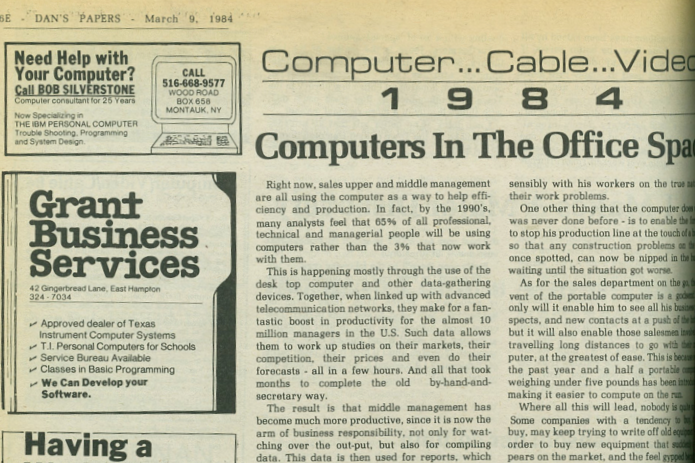30 Years Ago This Week: Computers In The Office Space

Editor’s note: This article was published in Dan’s Papers on March 9, 1984, as part of a column called “Computer…Cable…Video…1984.”
Right now, sales upper and middle management are all using the computer as a way to help efficiency and production. In fact, by the 1990’s, many analysts feel that 65% of all professional, technical and managerial people will be using computers rather than the 3% that now work with them.
This is happening mostly through the use of the desk top computer and other data-gathering devices. Together, when linked up with advanced telecommunications networks, they make for a fantastic boost in productivity for almost 10 million managers in the U.S. Such data allows them to work up studied on their markets, their competition, their prices and even do their forecasts – all in a few hours. And all that took months to complete the old by-hand-and secretary way.
The result is that middle management has become much more productive, since it is now the arm of business responsibility, not only for watching over the output, but also for compiling data. This data is then used for reports, which many executives need in order to make their important decisions. It’s, however, unfortunate to note that with the dawn of the computer age, many middlemen that have formerly been needed to collect all of this data will not be needed. The computer has replaced their jobs. Thus, what the executive of tomorrow will save is $25,000 (or more) by replacing these positions with approximately $7,500 worth of equipment.
Another job that the computer is changing is that of the foreman. What the computer has done here is to enable the foreman to have more power. What this means is that his ability to solve problems is quadrupled. By using a computer correctly, he can quickly order necessary parts, consult construction manuals at the touch of a button, and, more importantly, have the time to confer sensible with his work on the true nature of their work problems.
One other thing that the computer does which was never done before – is to enable the foreman to stop his production line at the touch of a button, so that any construction problems on the line, once spotted, can now be nipped in the bud vs. waiting until the situation got worse.
As for the sales department on the go, the advent of the portable computer is a godsend. Not only will it enable him to see all his business prospects, and new contacts at a push of the button, but it will also enable those salesman involved in traveling long distances to go with their computer, at the greatest of ease. This is because over the past year and half a portable computer, weighing under five pounds has been introduced, making it easier to compute on the run.
Where all of this will lead, nobody is quite sure. Some companies with a tendency to buy, buy, buy, may keep trying to write off old equipment in order to buy new equipment that suddenly appears on the market, and the feel gypped because they don’t actually see a return coming from their initial investment. Others who don’t buy the right kind of equipment to use with the type of office they have may also find themselves nixing the whole idea of the computer in the office because of one bag experience. One example of all thesis the use of electronic mail in certain companies. While in some companies, such as public relations firms, this has proven to be a helpful time-saving device, allowing for a less time spent typing, filing, xeroxing, and tearing up interoffice memos (not to mention hiding them from the prying eyes of inter office mail), in others it has not worked as well. In fact, depending on the frequency of the interoffice mail used in some companies, it has proven to be a waste, and often is not as tedious as the old way.



